Curated OER
Animating Motion
Young scholars apply what they recall about objects in motion by animati ng sequences of pictures that model a set of physical conditions. They animate the orbital motions of the Earth, the space shuttle, and the Moon based on...
Curated OER
Scientific Inquiry: Periodic Motion
Learners construct their own pendulum. In this physics lesson plan, students design an experiment to find the factors affecting its period. They formulate a conclusion based on experimental data.
Curated OER
Local Area - What Is a Region?
Students examine the physical characteristics of the Connecticut River Valley. They analyze maps and pictures, identify physical characteristics of the region, and color in the Connecticut River on a map.
Curated OER
Variations
Sttudents examine populations of living things and identify variations in physical features.
Curated OER
Come on In- the Water's Fine
Young scholars examine how coastal erosion effects seaside communities. They investigate how people have to make choices when manipulate the physical environment such as when dredging and constructing seawalls in coastal areas. They...
Curated OER
Litter Garden
Students discuss what man-made and natural materials are visible in litter. Using a sample of litter, they review the concept of decomposition between the two types of materials. They examine the two samples once and a while and record...
Curated OER
Eisenhower 1/26
Eighth graders identify and explain what Bernoulli's Principle is and draw diagrams to incorporate Pascal. They also perform simple calculations of density, buoyancy, and fluid pressure. Finally, 8th graders describe fluid pressure in...
Curated OER
Rocketry in Motion
Students investigate why a balloon flies in one direction as air escapes in the opposite direction, which helps them understand the nature of rockets and fireworks. Individually and in teams, students conduct research to create a...
Curated OER
Candy Quakes
Eighth graders use candy to show the effects of deformation forces on the earth's crust. In this rock and fossil formation lesson students construct models and simulations to describe and explain natural phenomena.
Curated OER
The Best Place in the United States to Live
Students, working in small groups, analyze information provided in U.S. maps to make a logical determination of the best place to live in the United States in regards to natural and human-made hazards. Then, working individually, they...
Curated OER
The Little Transistor That Could
Middle schoolers research the history of the transistor to explore the nature of technology. They complete a worksheet that coincides with given websites. Then they write a one-page essay about their findings.
Curated OER
Antarctic Jukebox
In this environment worksheet, learners read an excerpt about Antarctica, including the many challenges explorers face. Then they imagine that they are a sound recordist in Antarctica and record 3 CDs. Students look at the images given...
Curated OER
Universal Gravitation
Students create a KWL chart about gravity. In this astronomy class, students investigate the nature of gravity. They discuss common misconceptions and address them.
Curated OER
Mellowing With Age, A Closer Look
Students realize that aging is a "natural, continuous process" and develop sensitivity to the needs, desires, and capabilities of the elderly by interviewing elderly community members and photographing age related things.
Curated OER
Coin Investigation: How Can You Use Tools?
Students, by exploring a simple investigation system, see how technology can allow people to extend their senses and "see" beyond the world of their natural vision.
Curated OER
Catch Me if You Can
Third graders investigate behavioral and physical adaptations, such as camouflage, that allow animals to respond to life needs.
Curated OER
Tackling Taxonomy
Young scholars study physical characteristics of separate phyla and place them into similar groups. This lesson is part of a multi-segmented unit on the diversity of life. students develop a classification system by grouping animals into...
Curated OER
Motte Rimrock Reserve: Lesson Plan for Flora
Learners study the flora of Motte Rimrock Reserve while observing organisms in their natural environment. They use a dichotomous key to identify plants.
Curated OER
Steller Web Spinning Mystery
Students investigate what a system is in the scientific world. They watch a video of the Stellar seals of Alaska and develop clues as to why the seals are leaving. They discover through the clues they discover, how the components of the...
Curated OER
"For the Birds" [part I]
Students identify birds that appear in Chinese and Japanese art, learning about
their physical characteristics, classifying them according to scientific principles, and exploring their habitats and migration patterns. This is part one...
Curated OER
People Cause Pollution
Learners investigate the effects of industry on natural features. They discuss the industrial revolution, and create a drawing of a river with one half illustrating pre-industrial revolution time, and the other half representing the...
Curated OER
Periodic History
Students gain a perspective in the development of chemistry. They understand some of the topics in their text and the ongoing nature of research. They then will be able to see the trends of the periodic table first hand through their own...
Curated OER
Newton's Law of Universal Gravitation
Students explore the nature and magnitude of gravitational forces. In this gravitation instructional activity students study gravity and answer questions.
Curated OER
Michigan's Lumbering history: Yesterday, Today, and Tomorrow
Fourth graders explore lumbering in Michigan. For this lumbering instructional activity, 4th graders examine the life of a modern day lumberjack and how technology can interfere with natural ecology. Students create a list of...


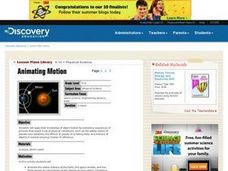




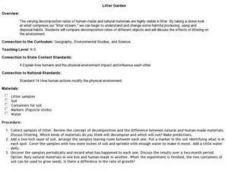
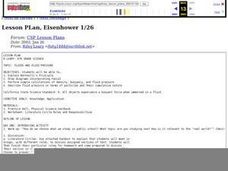
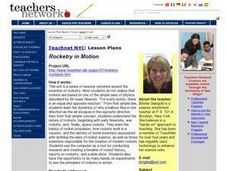


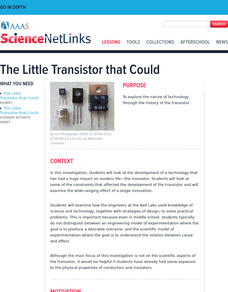



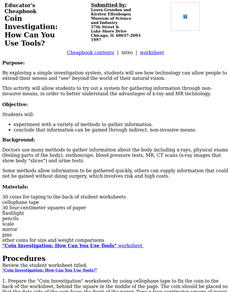




!["For the Birds" [part I] Lesson Plan "For the Birds" [part I] Lesson Plan](http://content.lessonplanet.com/resources/thumbnails/122462/large/cgrmlwnvbnzlcnqymdeymtaxny0ynji5lwd4n2h5by5qcgc.jpg?1414222903)



